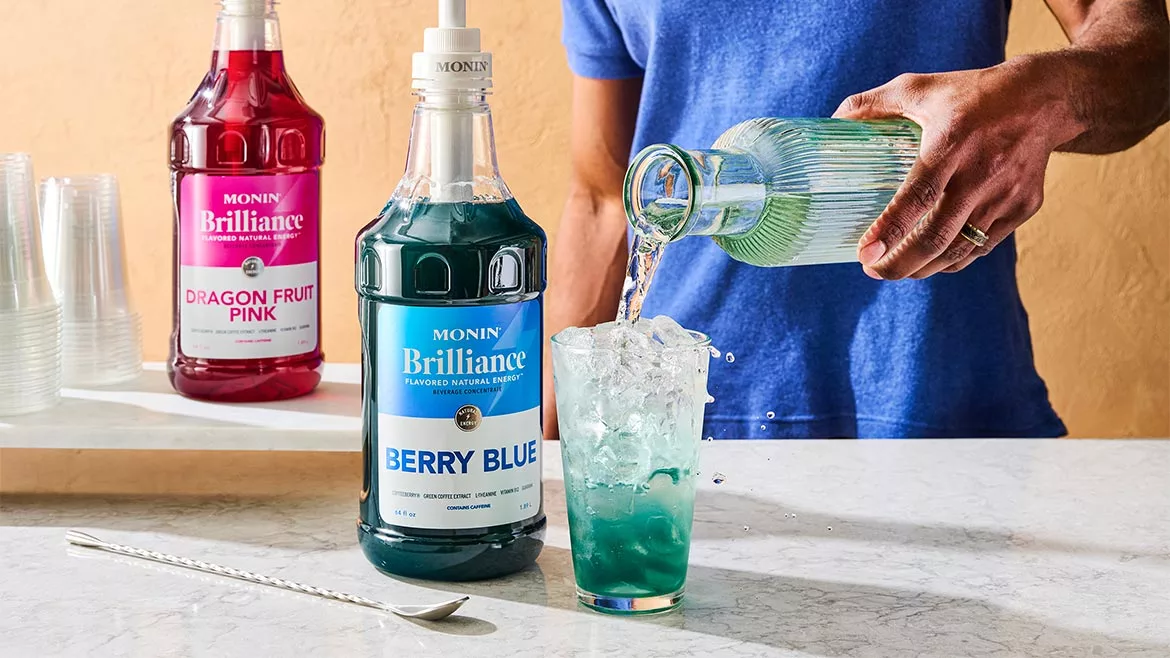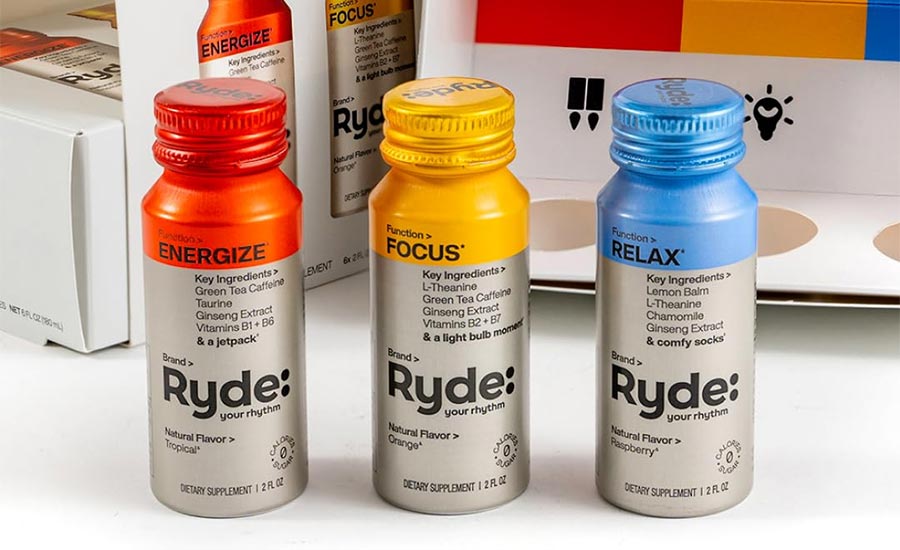Beverage-makers turn to natural energy solutions to meet market demand
Health, wellness macro trends drive consumer interest in natural energy ingredients

Image courtesy of Monin Americas
The phrase “back to the basics” can be defined as simplifying and concentrating on the essentials. In the realm of beverages, going “back to the basics” seems to be an ongoing theme, experts note, when it comes to current trends driving consumer interest in natural energy solutions.
“The two elements driving natural energy are natural and energy — a convergence of two mega trends in themselves,” says Niki Kennedy, director of insights and content at Glanbia Nutritionals, Chicago.
“Natural ingredient alternatives provide transparency, familiarity, and trust,” she continues. “Botanicals and plant-based sources seem to be filling the role today when it comes to functional health. According to Innova Market Insights, when purchasing an energy drink, one in four U.S. consumers say they’re influenced by ‘natural’ and ‘made with real ingredients’ claims.”
Kennedy adds that the second part of this trend — energy — is something consumers just never seem to have enough of.
“Our latest consumer study shows that one in three U.S. consumers struggles with their energy levels,” she says. “It rises to four in 10 for females. We also see in our research a high correlation between feeling low in energy and struggling with other health issues, including poor immunity, digestive health, fitness, and mood.”
Similarly, Stasha Johnston, senior vice president of marketing at Clearwater, Fla.-based Monin Americas, considers the health and wellness macro trend to be driving consumer interest in natural energy ingredients, noting that this trend has become evident across the younger generations.
“Consumers are increasingly prioritizing wellness, but they’re not willing to sacrifice flavor, experience or visual appeal,” she explains. “Today’s health-forward lifestyles are steering people away from traditional coffee and happy hour cocktails in favor of functional alternatives that offer natural energy along with added benefits — think vitamins, mood support, gut health, or sustained focus.
“Consumers want to order drinks that do more than refresh or give a jolt of caffeine. It’s no longer just about the boost — it’s about the boost and the experience,” Johnston continues. “Consumers are drawn to beverages that are vibrant, adventurous, and ‘insta-worthy.’”

Further, Johnston notes that clean-label energy drinks are winning on-premise, especially when they offer something different from the everyday coffee routine.
“This is evident in the rising popularity of matcha lattes, mushroom coffee, energy refreshers, and protein-enhanced beverages,” she says.
Brian Zapp, director of marketing at Applied Food Sciences (AFS), Kerrville, Texas, explains that the landscape for energy drinks, shots, etc., has evolved during the last three to five years.
“What went from the basic desire for cleaner labels and ‘better-for-you’ options shifted to a more complex set of demands,” Zapp says. Consumers are no longer just looking for a quick caffeine boost. Instead, they are actively seeking energy products that provide more abundant functionality to help them navigate their lives.
“For example, the leading trend we observe is products developing toward ‘energy plus focus,’ looking for nootropics to help elevate their brands,” he continues. “Along these lines, we also see requests for more ‘sustained energy,’ more ‘balanced energy,’ and even a recent push for ‘calmer energy.’ This all makes sense as consumers are less interested in being ‘amped up’ and more interested in being ‘lifted up.’ Elevated to a higher state of mood, productivity, mental clarity, without the jitters or subsequent crash associated with the energy products of old.”
Alongside focus, Zapp says that emotional well-being and mood support have become paramount to consumers.
Consumers want to feel good, feel happy, and experience a sense of upliftment,” he explains. “This means natural energy ingredients are now being evaluated not just for their stimulating properties, but for their capacity to contribute to a positive mental state and overall vitality. Energy, therefore, has become a much more complex and holistic concept, encompassing mental acuity and emotional balance. This is where truly innovative natural solutions are making their mark.”
Beyond caffeine
Given that the appeal of natural energy solutions comes down to perception and trust, experts highlight some of the benefits these solutions have to offer.
“Natural caffeine, by itself, has a list of benefits that mostly align with trust,” AFS’ Zapp says. “This is even more pronounced with organic certified ingredients.
“There is a high degree of skepticism amongst consumers, but organic ingredients provide consumers comfort in that they are free from certain solvents and void of harmful pesticides,” he continues. “This is only amplified if they originate from known raw materials such as tea and coffee. However, at AFS, we have a suite of natural energy ingredients that go beyond the boost of caffeine, with clinically studied benefits for beverages.”
Glanbia’s Kennedy considers caffeine to be the powerhouse behind functional energy solutions giving the lift to everything from coffee to soft drinks; however, she explains that consumers are seeking more natural solutions that don’t give them such a jolt — rather a smoother, more balanced energy bank.
“We’ve found in our own consumer research that within energy is the specific need for sustained vitality,” Kennedy says. “We see this as a real opportunity in the natural energy solutions category. Meeting needs for this particular occasion is all about providing lasting energy, as opposed to a quick burst, that also offers a positive contribution to health.”
Monin’s Johnston notes that energy drinks that once promised “extreme” effects are being scrutinized — given that now people are choosing to embrace healthier lifestyles and want their beverages to reflect that.
“Natural energy options feel safer, cleaner and more aligned with personal wellness goals. Ingredients like Coffeeberry, green coffee extract and guarana offer a more balanced energy boost — often paired with benefits like antioxidants, improved focus or mood support,” she says. “There’s also a major shift toward avoiding the harsh spikes and crashes associated with traditional coffee or chemical-laden energy products.
“That’s why Monin Brilliance Energy resonates so strongly: it delivers 80 mg of natural caffeine per serving from trusted sources and is made with natural colors and fruit-forward flavors — no artificial extras,” Johnston continues. “It gives consumers the energy they want, in a format that aligns with how they want to feel: clean, energized and in control.”
Aside from natural forms of caffeine that include variations of tea such as green, black, guarana, yerba mate, etc., Johnston notes that other plant-based ingredients, like beet juice, also are gaining popularity.
“While not a stimulant, beet juice is rich in natural nitrates that support improved circulation and sustained physical energy,” she explains. “These ingredients are put into practice in beverages like matcha lattes, energy refreshers, protein coffees and more.
“Monin specifically has made use of organic Japanese matcha powder in its Matcha Green Tea Concentrate that launched in May of last year, as well as most recently creating the clean energy line, Monin Brilliance Energy,” Johnston continues. “Brilliance features three forms of natural energy — Coffeeberry Energy, green coffee extract and guarana — and comes in nine varietals, including six natural options and three sugar free.”
Glanbia’s Kennedy explains that green coffee extract and green tea extract provide a natural source of caffeine for clean label energy drinks — such as fitness and women-focused energy drinks — that are disrupting the traditional energy drink category.
“Ginseng is also becoming a must-have botanical alongside ashwagandha, Rhodiola rosea and various mushroom species,” she says. “Outside botanicals and plant-based alternatives, ‘real ingredients’ like vitamins are in demand, too, with 48% of consumers globally interested in vitamins in their energy drinks. The B complex vitamins (especially vitamins B2, B5, B6, B7, B8 and B12) are the most relevant due to their role in energy metabolism. Iron and magnesium are other ingredients with an energy association and high level of consumer familiarity.”
AFS’ Zapp highlights the company’s comprehensive portfolio of the following natural energy ingredients, such as AmaTea Max Organic Guayusa Extract, PurCaf Organic Caffeine from Green Coffee Extract, PurGinseng Organic Panax Ginseng Extract, MycoThrive Lion’s Mane Mushroom Extract and MycoThrive Cordyceps Fungi Extract.
“Our comprehensive portfolio of natural energy ingredients is designed not just to ‘amp up’ consumers, but to truly elevate their energy in a more holistic way,” Kapp says. “Our solutions are scientifically validated to meet the nuanced demands of today’s market.”
Expanding horizons
The demand for natural energy solutions that offer elevated functionality is permeating across numerous beverage categories, experts note.
“Instead of energy drink, consumers are looking to functional beverages as the primary driver, as brands innovate to provide specific benefits like enhanced focus, mood support, and sustained energy,” AFS’ Kapp explains. “We’re seeing sophisticated formulations that combine natural stimulants with adaptogens and nootropics.
“Sports nutrition is an everlasting category that benefits from energy,” he continues. “However, the nuanced innovations tend to lean more toward personalized nutrition and women-specific formulas. Cognitive health nootropic drinks are emerging, responding to the demand for focused energy.”
Further, Kapp notes that beverages designed to enhance mental performance, concentration, and memory are leveraging ingredients like lion’s mane and guayusa to genuinely lift cognitive function.
Monin’s Johnston says natural energy is showing up everywhere — transcending traditional energy drinks with energy in teas, juice hybrids, and refreshers.
“The versatility and consumer appeal of natural caffeine make it a strong fit for multiple beverage types,” she explains. “One of the most exciting areas of growth is in the rapidly expanding no/low alcohol category, where consumers are seeking sophisticated, mood-lifting beverages that offer energy and functionality without the buzz. Natural caffeine, adaptogens, and botanicals are playing a noticeable impactful role in helping these drinks deliver a full-sensory experience with purpose.”
Glanbia’s Kennedy highlights how the traditional energy drink market has been on the front end to disruptive brands leaning into a more lifestyle approach to energy management.
“The step-change has driven a focus on ingredients with many of the up-and-coming market leaders leaning on ingredients like green tea extract, guarana root, guayusa extract, and ginger root — as well as essential vitamins and minerals like vitamins B and C,” Kennedy says. “In the ready-to-mix space, there have been a number of highly successful product launches with natural energy as the leading benefit supported by plant-based ‘superfood’ ingredients as well as vitamin and mineral complexes.
“It is also hard to ignore the boom in hydration RTMs and the recent hydration-plus products that are also trying to capitalize on ever-needed energy,” she continues.
As far as what is on the horizon for natural energy ingredients and the beverage market, Kennedy says that consumers increasingly are expecting their beverages to support broader health goals, including mental well-being and balanced lifestyles.
“Energy is a top functional claim, but consumers want it delivered through sources that fit their daily needs,” she explains. “We predict products that help consumers hack their habits are going to see continued future success. Convenient and flexible formats, functions to support health goals, and flavors to keep consumers engaged will allow beverage consumers to adapt to whatever is around the corner.”
Similarly, Monin’s Stasha predicts that the future of natural energy will involve the coalescence of three things: functional wellness, visual impact, and personalization.
“We’re seeing growing interest in clean caffeine sources paired with ingredients like l-theanine and vitamin B12 to support mood, focus, and sustained energy,” she says. “Formats that are both customizable and convenient — like Monin Brilliance Energy —will lead the way. Consumers want more than just energy; they want an experience.”
AFS’ Zapp considers the future of natural energy ingredients in the beverage market to be vibrant, promising even deeper levels of functionality and consumer connection.
“We envision a market where beverages truly lift consumers up, impacting not just their physical state but also their mental and emotional well-being,” he says.
Moreover, Zapp suggests that with the evolution of high-quality, scientifically backed, and sustainably sourced natural energy ingredients, beverage-makers need to innovate and create products that truly elevate consumers and build lasting trust.
“The future of energy is undeniably natural, intelligent, and emotionally supportive, and we’re here to help bring those visionary products to life,” he concludes.
Looking for a reprint of this article?
From high-res PDFs to custom plaques, order your copy today!







